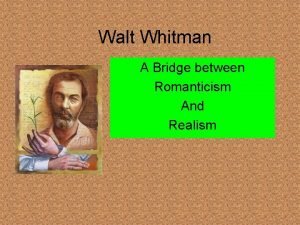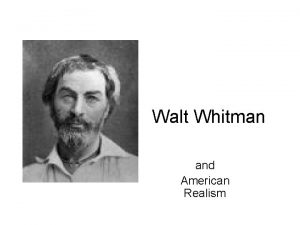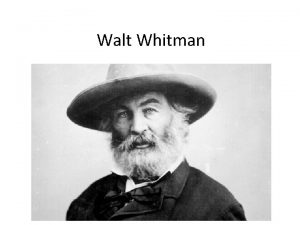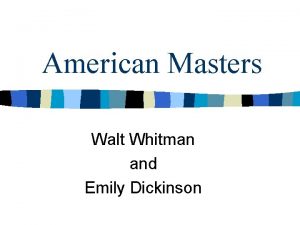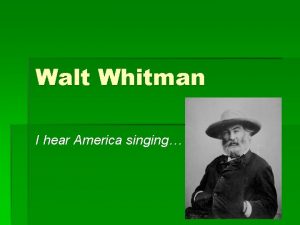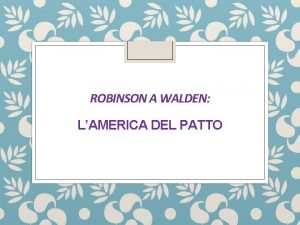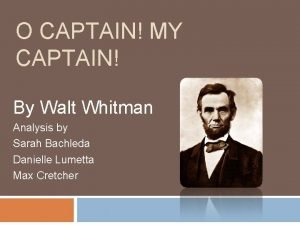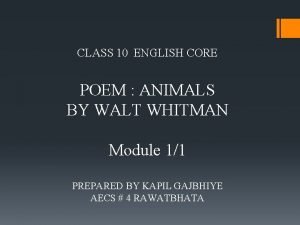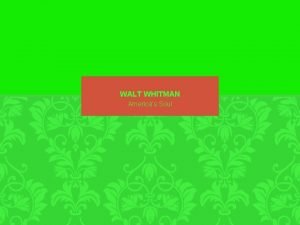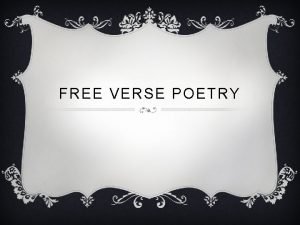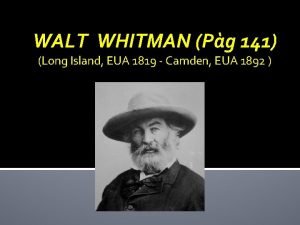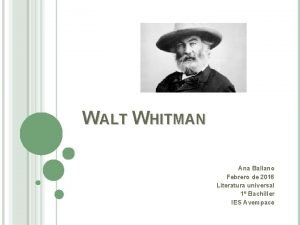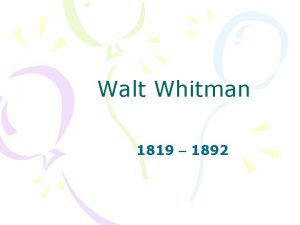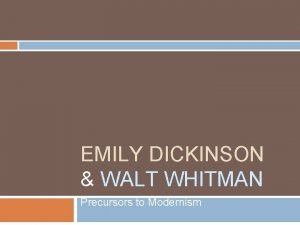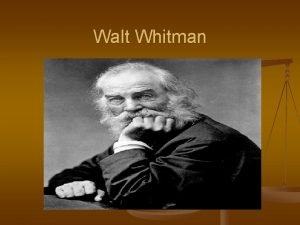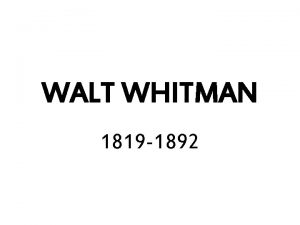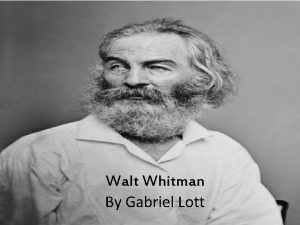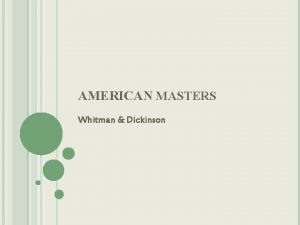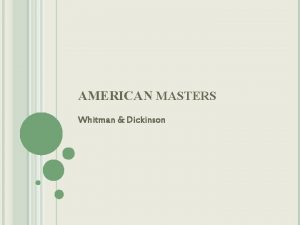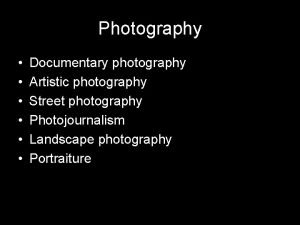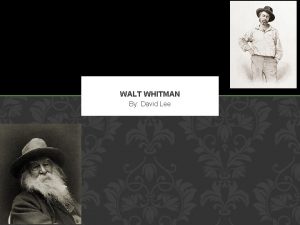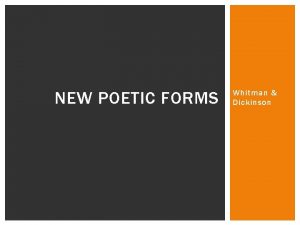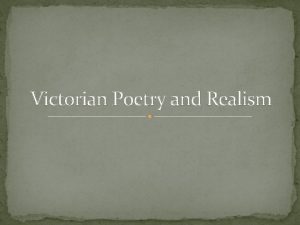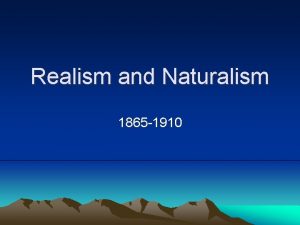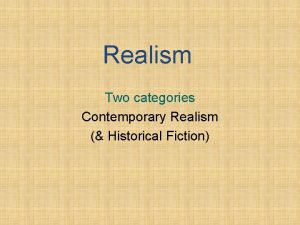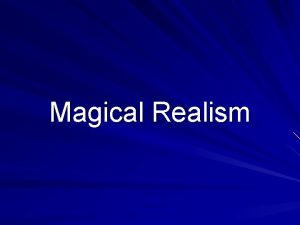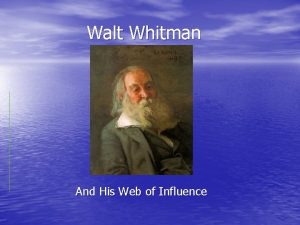Walt Whitman and American Realism Whitman and Photography



















- Slides: 19

Walt Whitman and American Realism

Whitman and Photography

“Visit to Plumbe’s Gallery” AMONG the lions of the great American metropolis, New York City, is the Picture Gallery at the upper corner of Murray street and Broadway, commonly known as Plumbe’s Daguerreotype establishment…. You will see more of life there –more variety, more human nature, more artistic beauty, (for what created thing can surpass that masterpiece of physical perfection, the human face? ) than in any spot we know of. ”


Whitman on Whitman “An American bard at last! One of the roughs, large, proud affectionate, eating, drinking, and breeding, his costume manly and free, his face sunburnt and bearded, his posture strong and erect, his voice bringing hope and prophecy to the generous races of young and old. We shall cease shamming and be what we really are. We shall start an athletic and defiant literature. ”—United States Review Sep. 1855

Whitman Mad Libs • • • Noun (something you celebrate) Noun (something you sing) Verb (same as above) Noun

• I celebrate _________, and sing _________, And what I _______ you shall ________ For every _____ belonging to me as good belongs to you.

• See “Song of Myself” sec. 1 at http: //www. princeton. edu/~batke/logr/log_ 026. html.

Emerson’s “American Scholar” • Recall Emerson’s purpose in his “American Scholar” speech: • “Our day of dependence, our long apprenticeship to the learning of other lands, draws to a close. [. . . ] Events, actions arise, that must be sung, that will sing themselves. Who can doubt that poetry will revive and lead in a new age [. . . ].

The 1855 Preface to Leaves of Grass • “The Americans of all nations at any time upon earth have probably the fullest poetical nature. The United States themselves are essentially the greatest poem. ” • “[. . . ] the genius of the United States is not best in its executives or legislatures, nor in its ambassadors or authors or colleges or churches or parlors, nor even in its newspapers or inventors. . . But always most in the common people. [. . . ]—the terrible significance of their elections—the President’s taking off his hat to them not they to him—these too are unrhymed poetry. It awaits the gigantic and generous treatment worthy of it. ”

Quotations • “Of all nations the United States with veins full of poetical stuff most need poets and will doubtless have the greatest and use them the greatest. ” • “The greatest poet hardly knows pettiness or triviality. If he breathes into any thing that was before thought small it dilates with the grandeur of life of the universe. He is a seer. . he is individual. . . he is complete in himself. . the others are as good as he, only he sees it and they do not. ”

So What is Poetry? • “The poetic quality is not marshalled in rhyme or uniformity or abstract addresses to things nor in melancholy complaints or good precepts, but is the life of these and much else and is in the soul. [. . . ] Who troubles himself about his ornaments or his fluency is lost. This is what you shall do: Love the earth and sun and the animals, despise riches, give alms to everyone that asks, stand up for the stupid and crazy, devote your income and labor to others, hate tyrants, argue not concerning God, have patience and indulgence toward people, take off your hat to nothing known or unknown or to any man or number of men, go freely with powerful uneducated persons and with the young and with the mothers of families, read these leaves in the open air every season of every year of your life, reexamine all you have been taught at school or church or in any book, dismiss whatever insults your own soul, and your very flesh shall be a great poem [. . . ]”

One more Quote • “The proof of a poet is that his country absorbs him as affectionately as he has absorbed it. ”

Song of Myself http: //www. princeton. edu/ ~batke/logr/log_026. ht ml Section 1 and Section 15

Ways in which Whitman revolutionized American poetry • (1) subject matter • (2) language • (3) look of the poem (free verse)

Realism • Post-Civil War movement in America Key events: • Darwin’s Origin of the Species (1859) • Rapid industrialization, urbanization, immigration in the 1870 s • American growth westward • Rise of pragmatism

Realism • Set itself up as an antidote to the excesses of Romanticism • Beginnings in Local Color Movement of the Old Southwest (1830 s)

General characteristics of Realism • (1) a faithful representation of everyday life based on observation by the writer • (2) a “reliance upon the representative rather than the exceptional in plot, setting, and character” • (3) an attempt at objectivity

Whitman and Realism • Whitman’s Civil War Work • Poems: “Cavalry Crossing a Ford” at http: //www. webbooks. com/Classics/Poetry/Anthology/Whi tman/Cavalry. htm “The Wound Dresser” at http: //www. drpsychotic. com/classic_writings/ the_wound_dresser. html
 Whitman transcendentalism
Whitman transcendentalism Walt whitman realism
Walt whitman realism Walt whitman photography
Walt whitman photography Walt whitman literary movement
Walt whitman literary movement American masters whitman and dickinson
American masters whitman and dickinson House breakout plan
House breakout plan Walt whitman's, i hear america singing, celebrates
Walt whitman's, i hear america singing, celebrates Andai nei boschi walt whitman testo
Andai nei boschi walt whitman testo Mournful tread connotation
Mournful tread connotation Animals poem class 10 figures of speech
Animals poem class 10 figures of speech One's self i sing meaning
One's self i sing meaning Walt whitman bio
Walt whitman bio Walt whitman happiness not in another place
Walt whitman happiness not in another place What is freeverse
What is freeverse Walt whitman english
Walt whitman english Walt whitman house long island
Walt whitman house long island Ana whitman
Ana whitman Walt whitman born in new york in 1819
Walt whitman born in new york in 1819 Walt whitman modernism
Walt whitman modernism Walt whitman biografia
Walt whitman biografia

